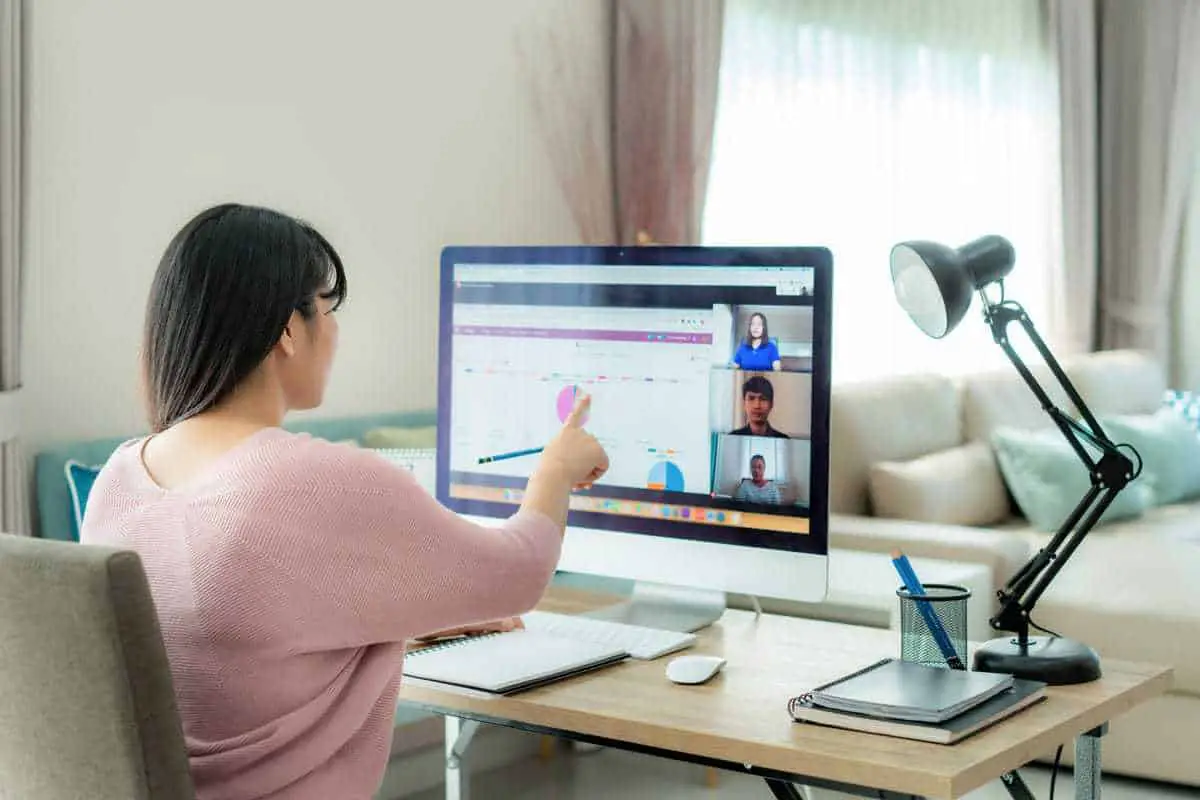COVID-19 has momentarily put the world at a standstill. Quarantine restrictions led to businesses closing down and many people losing their livelihoods. However, companies soon adopted a scheme to keep the economy afloat — remote work.
But, what exactly does remote work mean? Remote work is an arrangement that allows employees to work virtually from anywhere. All they need is a device and an Internet connection, and they can get started. It is also called work-from-home, telecommuting, telework, and distance working.
Remote work is a sustainable practice that can redefine the future of work. As LinkedIn CEO Ryan Roslansky says, “After many people have experienced 18 months of pandemic-induced remote work, companies are starting to rethink culture, expectations, and policies to reflect what looks like a permanent shift to a hybrid work model. At the same time, employees are also rethinking the work they do and looking for work that aligns with their values and needs.”
says, “After many people have experienced 18 months of pandemic-induced remote work, companies are starting to rethink culture, expectations, and policies to reflect what looks like a permanent shift to a hybrid work model. At the same time, employees are also rethinking the work they do and looking for work that aligns with their values and needs.”
Some may feel hesitant to plunge into the remote-work lifestyle. It is somewhat intimidating, especially for those who have practiced the traditional work arrangement for years. Fret not. You can learn more about working remotely — its definition, some advantages, and common misconceptions — as you read this article!
Remote Work Definition
Remote work is a flexible practice where employees can fulfill their jobs away from their company’s place of business. The arrangement can be temporary or permanent, part-time or full-time. Through remote jobs, employees gain access to better work-life balance, more career opportunities, and minimal commute costs.
Companies also benefit from this arrangement through cost savings on physical resources, increased employee satisfaction, and higher productivity. Hiring for remote workers also presents companies with a wider pool of talents.
As Ian Barkin , former host of Sykes podcast and now founder of Stealth Mode, happily said in his LinkedIn post: “I am so encouraged by the idea of remote work, virtual teams, and work at home arrangements allowing these global rock-stars to collaborate in new and seamless ways to shape a future of work we could only dream of a few short years ago.”
, former host of Sykes podcast and now founder of Stealth Mode, happily said in his LinkedIn post: “I am so encouraged by the idea of remote work, virtual teams, and work at home arrangements allowing these global rock-stars to collaborate in new and seamless ways to shape a future of work we could only dream of a few short years ago.”
Remote jobs run on the idea that work can be completed successfully regardless of where it is conducted. With technology, we now have access to various collaborative platforms. These platforms enable us to connect with work colleagues and track each other’s progress even without meeting face-to-face.
In recent years, remote work has become a standard practice in many countries. According to a Reuters poll in 2012, about 1 in 5 workers all around the world regularly telecommutes. The poll also indicated that ten percent of the participants work from home daily. And now, with COVID-19, remote work has become the main work arrangement for many.
in 2012, about 1 in 5 workers all around the world regularly telecommutes. The poll also indicated that ten percent of the participants work from home daily. And now, with COVID-19, remote work has become the main work arrangement for many.
Five Perks of Working Remotely
Glint even reveals that 87% of employees prefer the work-from-home scheme because of its flexibility. Let’s look at why more and more people want to work remotely.
prefer the work-from-home scheme because of its flexibility. Let’s look at why more and more people want to work remotely.
1. Better Work-Life Balance
Working from home saves you time. The flexibility in work hours allows you to take control of your schedule. The hours you used to spend on the commute can now be allotted to things that truly matter to you.
Ainsley Ward , Vice President at CGI, even goes on to share that “The flexibility of remote work and a supportive employer enables us both to continue in our roles with [a] great company and find a better work-family balance as we go forwards.”
, Vice President at CGI, even goes on to share that “The flexibility of remote work and a supportive employer enables us both to continue in our roles with [a] great company and find a better work-family balance as we go forwards.”
2. Better Work Environment
Not reporting to the office means you won’t have to deal with workplace drama and vexing colleagues. You also have the freedom to customize your work environment when you work remotely. If you don’t feel any inspiration at home, you can also drop by your favorite café to get in the zone.
We have written a detailed article, Going Remote: How to Create Your Own Flexible Workspace on how you can personalize your space for a better work environment!
on how you can personalize your space for a better work environment!
3. Increased Productivity
Working remotely means fewer distractions, less inefficient meetings, no office drama, and reduced interruptions. Having more time for yourself also lets you have a good amount of rest.
In a LinkedIn post by Derek N.H. Notman , Founder at Conneqtor, we learn that “we are putting much more emphasis on quality of life and realizing that in doing so we can actually improve productivity.”
, Founder at Conneqtor, we learn that “we are putting much more emphasis on quality of life and realizing that in doing so we can actually improve productivity.”
Moreover, all of us have different productivity windows. Some are more productive in the morning, while others can work better at night. The flexible schedule remote work offers grants employees the opportunity to work at their own pace.
Remote jobs also allow you to finish your work comfortably, which can also lead to higher productivity. For additional ways to become more productive, you can check out our article on Eight Ways to Increase Productivity .
.
4. More Savings
Traveling to and from your workplace can be costly. With the work-from-home scheme, however, you get to save on commute fare, gas, and/or car maintenance. You also won’t have to spend so much on buying work clothes. Remote work not only promises a flexible schedule but also a flexible budget.
Brian de Haaff , Co-founder and CEO at Aha!, even says: “$2,127 is the specific amount one remote worker calculated she saves annually by not having to go into an office. Those bonus dollars were a result of saved expenses, such as gas and lunches out.”
, Co-founder and CEO at Aha!, even says: “$2,127 is the specific amount one remote worker calculated she saves annually by not having to go into an office. Those bonus dollars were a result of saved expenses, such as gas and lunches out.”
5. Promotes Health and Safety
With a flexible schedule comes more time for you to invest in your health. Remote workers get more time to exercise, relax, and eat healthily. Since you also spend more time indoors, you won’t have to worry much about contracting illnesses. After all, staying indoors is also of top priority during this pandemic.
Common Misconceptions About Remote Work

Remote work has been steadily gaining momentum as a sustainable work arrangement, especially in these trying times. However, not everyone is hooked on this concept. Here are the most common misunderstandings we often hear:
It’s Not Real Work
For traditionalists, a job is all about wearing a suit, the painstaking commute, and running around the office. They believe that remote workers do nothing but sit in front of their computers in their pajamas. We should know by now that this is not true at all.
Remote workers come in different types. Some start the day early, while others, in the wee hours of the night. Others also polish up, while some work in loungewear. No matter their practice, what we know of remote workers is that they can finish the job.
It’s Extremely Hard
To be fair, when does work not have any challenges? You’ll inevitably face some troubles while working remotely. However, the whole transition from office to remote workspace is not as difficult as many make it out to be. Of course, you’ll have to ease into this new work scheme because you are not used to it yet. But in time, you’ll be able to breeze through your work remotely as you did back in the office.
If you are looking for more tips to transition better, then you can check out our article A Practical Guide to Transitioning to Remote Work .
.
Remote Workers Are Bad Communicators
Many people think that remote workers choose their jobs because they won’t have to deal with people. However, many remote jobs are in the field of customer support.
Customer-support jobs are all about interacting with people, which can be the worst nightmare for bad communicators. So no, remote workers are not necessarily bad communicators. Just because a job is online does not mean it caters to those who cannot handle real-life interactions.
Remote Work is a Flexible Work Arrangement
Remote work is a flexible work arrangement that enables us to work from anywhere. For some, it may also be a job model that allows them to work from home despite the global pandemic. Remote work also means having more time for yourself and your family. It means becoming a happier version of yourself without compromising your career.
It’s time we enter a new era of work practice that benefits employees and employers alike with remote work at its core.
Related Questions:
Is a remote-work setup 24/7? Remote work is a flexible work arrangement that enables employees to finish their job virtually anywhere at their own pace/schedule. A worker’s schedule will depend on their company’s deadlines and policies. The minimum requirements for this setup are a laptop and an Internet connection.
What are the perks of being in a remote work arrangement? Remote jobs allow flexibility through employee autonomy, employee customization, and economic sustainability. Working remotely gives employees the power to design their work process for increased productivity and a better workspace.

